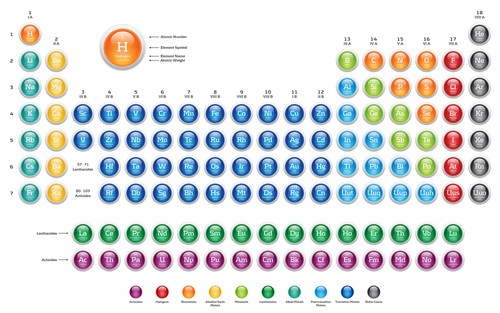Interview With an Element: Chlorine
by Simone Bauer

Are you Bleach?
No. I am not Bleach, I am me. The success of Bleach would not have been possible without Sodium and Oxygen. We all have our roles to play. Oxygen does its own part. On my own I am just chlorine, but as sodium hypochlorite something more than that. My solo career was never as successful, looking back I needed time to see that — and I guess time to grow as an element.
Is it true that Bleach is behind “Eau de Labarraque”?
Yes. Eau de Labarraque was our first project together, and that goes way back to that summer in France in 1820. Many people accused us of selling out when we started over as Bleach, but it was just a natural step in our development at the time and a way to reach a greater audience.
What would you call your greatest success with Bleach?
Clearly that is our role in disinfection. Everyone knows about drinking water and swimming pools. We were even involved in deodorizing the body of Louis XVIII… But I would say our role in preventing child bed fever is something that is often overlooked. Our project with Ignaz Semmelweis in the 1840s did not gain the recognition it should have. His idea of disinfecting your hands after dissection of a cadaver and assisting in the delivery room was so new at the time it was rejected by the medical profession for decades. Semmelweis died at the age of 47 of gangrene after a severe beating in a mental institution asylum in Vienna, and I wish he would get more recognition.
Why did your partnership with Oxygen end?
It did not end. The media love to spread rumors about rivalry, especially after oxygen started its new project OxiClean more than a decade ago, but we remain good friends. Oxygen may be more popular and is getting not as bad press as me, but I am not bitter. I am focused on my collaboration with Sodium and do not have much time to follow whatever gossip is making the rounds.
Do you see Sodium much nowadays?
Yes, we look back on a successful career together, but are not out of great ideas yet. Sodium completes me in a way that no other element does. Lately our reviews have not been great, but we are ready for a comeback. Sodium has been taking the blame for much that seemed wrong with Salt, but without it everything would be bland. Our contribution to food has been legendary, something acknowledged even by our harshest critics. At this point I would like to plug a new venture of mine. I got involved with Sugar, and discovered that my remix of their classic work is even sweeter than the original, and I even prevent any nutritional effect. Our joint offering sucralose is now available in stores.
Let’s get back to your solo career — what are your feelings about that?
When I was younger I felt it necessary to gain recognition for my work as Dichlorine, in elemental form I cannot use my naiveté as an excuse. I was not that young back then, Scheele discovered me in 1774, but yearning for recognition of my great oxidizing potential. For the first time there was enough electricity to produce me in large quantities. When I was approached by Fritz Haber in 1915, I did not have the backbone to say no. His wife Clara — also a chemist — committed suicide in protest, but it was no deterrent. I am not proud of being used as a poison gas and my role as lethal irritant, including my involvement part of phosgene and mustard gas. The ability of humans to invent new ways of involving me should serve a better purpose. As it turned out, a spinoff of mustard gas ended up being the first chemotherapy drug after WWII. I gained a new level of insight and am much happier to play a small but important part in drug development, and am honored to be part of leukemia treatment. True, much of my other work as parts solvents and anesthetics did not pan out as planned at the time, because of liver toxicity.
What would you say to your greatest critics?
They have to face it: I am unavoidable in life. I am in the earth crust, and the third most abundant element in sea water. I am indispensable in the production of plastics, and while many would like to live using less plastic, I am personally convinced that PVC sewer pipes save more lives than are lost due to the effect of phthalates (which I am not involved with). I too am aware of my useful contributions to humanity over the last millennia, and am not afraid of hiding my involvement with the darker sides. Don’t give chemicals a bad name. Think of me next time you jump in a pool.
Simone Bauer has a doctorate in chemistry, was born and raised in (West) Berlin, lived for the last eight years in NYC, and just moved to Cambridge, MA.
Image by concept w, via Shutterstock